
This review may contain spoilers
The Absolute Best Adaptation of Hana Yori Dango
I have a weird addiction to Hana Yori Dango. The original story is incredibly toxic and I hate the male lead in nearly every version and can't root for the main ship because the ML is just too violent and scary. But I have still watched and enjoyed every drama adaptation, almost against my will and morals because this story is a hot mess.So when the F4 Thailand teaser trailer dropped in late 2020 I knew I'd be watching simply because I inhale Hana Yori Dango adaptations like potato chips. But right away I got excited because I could see that the director was willing to go dark and incorporate modern elements like social media bullying.
Fast forward to December 2021. I jumped on the first episode right away and was immediately floored. The bullying was much darker and more intense than in any other version. The famous F4 entrance that is glamorized in every other version was instead transformed into an entrance into a decrepit stadium that was more like Roman emperors entering a coliseum to see martyrs being torn apart by animals (emphasized by the leader of the F4 wearing a leopard skin coat and tiger striped shirt).
Additional changes to the story and characters in that first episode were remarkable. The mother was introduced right away and she was the origin of the red card game, encouraging Thyme to ruthlessly rule the school so he can learn to ruthlessly lead their business empire. Gorya, the female lead, felt realer than in other versions. Yes, she was strong, but also vulnerable and thoughtful. Her family was supportive instead of a clown show and the show gave the famous "good shoes take you to good places" line to her father. Finally the second male lead, Ren, was more active and interesting than the emo boys of other adaptations. He rescues Gorya from the red card bullies in a spectacular scene that ends with him drenched in water so it looks like he's being baptized.
The reason I'm giving this level of detail about the first episode is because it illustrates the level of care and attention given to every aspect of this production. Characters are given more depth. Key scenes are tweaked to make them more emotionally weighty. The bullying is taken very seriously and the male lead goes on a real redemption journey to transform himself into a better person and atone for the harm he's caused. There's also a strong social and capitalist critique that threads the entire narrative (the title of episode 9 is The Incident of 1% which is a reference to a term popularized during Occupy Wall Street)
The result is an adaptation that reaches the level of brilliance in certain episodes. The director really took this regressive teen franchise and turned it into sociopolitical commentary while using complex metaphors and symbolism through set design, costuming, sound design, and cinematography. I was literally gasping through some episodes and often became emotional over how much care the director gave to telling this story.
Is it perfect? No. The production ran into major problems thanks to covid shutdowns, limited episodes and the constraints of the Hana Yori Dango plot which always goes off the rails at the end (I was hoping F4 Thailand would beat this curse but alas no). The production gets very rushed at the end, character motivations go out the window and the PPL becomes oppressive. Also if you're in it for the romance just know that while there are swoony moments there aren't as many cute couple moments as other adaptations.
Despite all that, this show is an absolute must-watch. It's already a modern classic and is by far the best adaptation of this problematic teen franchise. If you've seen other versions and think you can't stomach watching another, just give this one a chance. And if you've never watched because you've heard how regressive and awful this story is, just know that this adaptation grapples with the toxic elements of the original and truly redeems the male lead.
Was this review helpful to you?
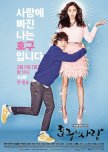
This review may contain spoilers
Feeling super conflicted about this drama
I just finished Hogu's Love (2015) and wow do I feel conflicted about this drama. It tells the story of the unlikely romance between Ho Gu, a loveable self described squid (someone who just drifts along in life), and Do Do Hui, a beautiful woman who is a medal winning competitive swimmer.The parts of this drama that worked were wonderful but the parts that didn't work were so bad that they almost ruined the whole thing.
What Worked:
1. The Female Lead: I loved Do Do Hui because she's a FL that you don't often see in Kdramas: at the start she's cold, harsh and aloof but as you get to know her you understand why: people are always treating her as an object of desire or trying to get something from her and she doesn't have anyone in her life who she can trust. I've seen people say they hate her which is kind of a bummer because she's one of the most complex and interesting FL's I've seen in a long time
2. The Second Male Lead: Byeon Kang Cheol was a fantastic character who got saddled with a shitty storyline. I still loved him because he was kind of ridiculous but he grew a lot over the course of the drama, evolving from a vain lawyer living a sterile and lonely life to a person who enjoyed eating raw squid and soju and singing at the noraebang with friends. The actor did a fantastic job playing him.
3. Supporting Cast: Hogu's parents, his friends, Byeon Kang Cheol's parents and his secretary were all terrific and added a lot to their scenes.
4. Creative Storytelling and Humor: There's a lot of slapsticky humor which is normally not my kind of thing but I loved most of it. There's also a lot of creative fantasy sequences and one epic scene where high school boys brawling over a naked drawing of the FL fall into poses from famous paintings. Hogu's squid meltdown (you have to see it to understand what I mean) was another epic moment.
What Was So-So
1. Ho Gu was a frustrating character. Sometimes he was sweet and adorable and other times I wanted to strangle him because he kept being presumptuous and sticking his nose where it didn't belong. It was especially galling when he did things without asking Do Do Hui first. I will say it got better as the character evolved and matured. His final reconciliation with Do Do Hui was lovely.
What Didn't Work At All
1. The drama brings up serious issues like sexual assault, abortion, single motherhood, suicide, slut shaming, etc. The problem is it either deals with them perfunctorily (for example, leaving the assault trial for the very end of the last episode) or really poorly (very negative messages about abortion which I did not need to see when the US has abortion access being destroyed). There's also a major Coffee Prince-esque storyline that played is he or isn't he gay for the entire drama and it's wildly insensitive. I kept shouting at my screen JUST LET HIM BE GAY, GAWD.
2. Ho Gu's sister was manipulative and a raging asshole with a violent streak and I never liked her.
Do I recommend you watch this?
Maybe. You'd have to be willing to overlook a lot, esp. the gay identity storyline, but the characters are mostly wonderful and the relationship between Ho Gu and Do Do Hui is incredibly heartwarming. I tend to drop dramas very easily but this one hooked me from beginning to end and that's saying something.
Was this review helpful to you?

It was fun but could've been so much more
The production values were incredible and especially impressive for a Thai series, the leads were all eye candy and some of them could actually act (especially Paper, Almond, Chanel and Bovy), some of the games were fun. But there were so many missed opportunities to make this show deeper and more interesting.The premise is that most of the men in the world die off and the ones who remain become a commodity to exploit. What happens when men are out of the way and women are the ruling class - are they really interested in solving the problem of male births or do they actively suppress knowledge that would fix the birthrate in order to secure their power? How are the men treated in the marriages, is it similar to how women are treated in patriarchal societies where they are abused and have no freedom? What is it like when men are forced to breed (this is kinda sorta touched on with Paper but the full implications of that aren't explored).
Don't get me wrong, this show is a very fun binge and I enjoyed it, just felt let down when I saw the potential it had to be so much more.
Was this review helpful to you?
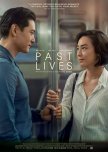
Not as good as I expected
People have been raving about this film and one of the leads, Yoo Teo, became a favorite after I saw him in the Kdrama Love to Hate You so I had high expectations. Unfortunately, I feel let down after seeing this. It's definitely not a bad film and the cinematography is stunning. But the characters are underdeveloped and I especially had trouble with the FL who I found neither likable or interesting. As someone from a non-English speaking family who moved 3000 miles away from home as a young adult, I expected to relate to the story's characters and themes but instead they mostly left me cold.The saving grace of the film is Yoo Teo, who delivers a wonderful, melancholic performance as a man who can't bring himself to stop asking what if. His eyes hold all of the emotion and poignance that should've been present in the film's writing and the FL's characterization. Alas, he was the only person I empathized with.
Was this review helpful to you?

This review may contain spoilers
An unexpected gem!
I had no plans to watch this drama but a friend recommended it to me and I was amazed by how much I loved it. It's incredibly well written with strong characters who change and grow in ways that feel organic and grounded even within the fantastical plot device of time travel. I love that Kawi and Pisaeng coming out to themselves & others and embracing their love for each other turns out to be the key to everyone's happiness, not just their own.I honestly don't get the hate for Kawi. Yes he starts out as a selfish loser but the journey is the point, once he realizes how much he's harming the people he cares about he works hard to grow into a better, braver person. He's prickly to the end but that's his personality which Pisaeng clearly knows and finds endearing. The very end of the series where Kawi loudly proclaims he doesn't want a wedding but plans out the details while Pisaeng walks behind him looking bemused perfectly captures their dynamic and I loved it.
The show has a strong LGBT sensibility which you don't always get in a BL. The scenes with Pisaeng first standing in front of a gay bar afraid to go in then going in and freaking out because Max recognizes him were poignant. I think it's important that Pisaeng goes through coming out first before he and Kawi get together. Kawi's journey is different but very important because we get to see what happens in one of the alternate futures when he's closeted and putting Pisaeng through an incredible amount of pain as a result.
There's a lot of skinship in the show but the way it's portrayed evolves from scenes where Kawi is drunkenly kissing Pisaeng but not willing to enter into a real relationship to the skinship that happens after he confesses and then at the end when they are a longtime couple. I appreciate that the director thought through the details and didn't just serve the same thing in every scene where they kiss or touch each other.
The confession scene is incredibly sweet and honestly the first lovemaking scene made me cry. I love the crosscutting with the poem which I know a lot of people found cringey but the poem is wonderful and captured a lot of the themes of the series.
The secondary characters are incredibly well written, especially Pear who goes through her own emotional journey and growth through her relationship with her parents. I loved that the core friends group remains together at the end and they all got to see Pear get her happy ending.
This is a BL that starts in college but tells a mature story about adulthood, embracing your true self, and accepting the ups and downs of life. Truly wonderful and I hope GMMTV keeps investing in well written and directed stories.
Check out our podcast on Be My Favorite (SPOILERS):
YouTube: https://youtu.be/xf1z29hVLKE?si=sRPC9zm8me1mFd3o
Podcast streaming service: https://pod.link/1556918754/episode/e8bf73061708c29b7c0cfdf7cadbdda5
Was this review helpful to you?
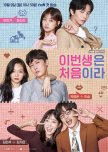
This review may contain spoilers
An 8 that should've been a 10
I started this drama because I'd seen Lee Min Gi in Dal Ja's Spring but my expectations were pretty low since the plot synopsis didn't seem interesting. But I unexpectedly fell in love with the show (at least up to episode 12). It's a sensitive and emotionally powerful look at how young women's dreams are undermined and stomped on.For example, the FL is forced to leave the apartment she shares with her brother when his girlfriend gets pregnant (if she stays, she'll be forced to become a nanny and housekeeper for the household) and then later is nearly sexually assaulted by a work friend and has to quit her job after her bosses try to force her to continue working with him. In one scene she's wandering the streets alone at night in her pajamas and crying because she literally has no place to go. It's no wonder she enters a loveless contract marriage just so she has a safe and quiet place to sleep every night.
Even after the ML & FL get married their families try to force both of them into traditional gender roles. She's asked to attend her in-laws' memorial rites ceremony and has to do all of the cooking and clean up solo. Even when her husband tries to help her with the work, he's told by his mother that he'll shame his wife.
One of the most poignant scenes in the drama is at the wedding when the ML reads a letter written to him by his mother-in-law begging him to allow her daughter go back to her career as a writer if she wants to. The mother was trying to prevent her daughter from experiencing the same pain she'd gone through as a wife. I literally ugly cried watching it and I still tear up thinking about it.
But the drama isn't all dark and heavy. In fact it's often laugh out loud funny. There's hilarious scenes like when the leads announce their engagement to their family and friends and when the ML helps his in-laws make kimchi. And the FL's two best chingus add a lot of funny moments to the story.
The romance is an extremely sweet slow burn (up to episode 12, sigh) where you see two introverted and skittish people gradually fall in love. There's so many lovely moments like the wedding scene where the FL is sobbing uncontrollably just as their ceremony is about to start. Even though they are nowhere near being in love yet, the ML kneels down and tells the FL she doesn't have to stop crying, they can walk down the aisle together and that he'll stay by her side. I cried so hard in that scene.
So why isn't this a 10? The last four episodes.
The ML's first love shows up and this causes much cliched angst and sorrow for the FL (though she turns out to be a decent person) . The FL then inexplicably believes she has to choose between a highly compensated job at her husband's ex's firm or staying in a relationship with the ML so she turns down the job (wtf!). Then for no freakin' reason at all the FL decides she has to divorce the ML even though she's in love with him and she's aware that he's about to ask her to make their marriage real. (wtfffff!) Then she freakin disappears for months, leaving the ML an emotional basket case who ends up selling his home to escape bad memories. When the FL comes back, she simply crawls into bed with him and kisses and tada he instantly forgives her. (wtfffffffffffffff!) It literally feels like an entirely new writer came on board for the last four episodes. This ending isn't Do Do So So La La Sol levels of bad but still bad enough to leave me not feeling much when the leads finally get together for real.
Do I still recommend you watch this? Yes because the early episodes are hilarious, heartwarming and heart breaking and the depictions of women in their early 30s struggling just to survive are dead accurate .
Was this review helpful to you?

This review may contain spoilers
Sensitive exploration of trauma, disability and death
Will Love in Spring got me thinking of a book called Stigma: Notes on the Management of Spoiled Identity by Erving Goffman, which analyzes the situation of people who are unable to conform to standards that society calls normal and as a result are disqualified from full social acceptance.Zhuang Jie & Chen Maidong are both unfairly stigmatized by disability and death. As a result, they are constantly struggling to deal with the perceptions others have of them. Even though they're attractive, intelligent and respected, the people around them are also frightened, uncomfortable and even disgusted by them: Zhuang Jie because of her amputation and Chen Maidong because he works with dead bodies. As a result, they have come up with very different strategies for managing their stigmatized identities.
Zhuang Jie left her hometown to move to Shanghai where she is surrounded by people who don't know her well. She has created a persona that is loud, outgoing, and extroverted (very different from who she was in high school after her accident). She's successful in her career but still considered damaged goods when it comes to romantic relationships. Her ex-boyfriend's family refused to accept her because of her disability. As a result she fears being physically intimate with a man and at heart she's deeply lonely despite having dozens of acquaintances.
Chen Maidong has chosen to stay in his community and embrace his outsider status. He chose his career because of traumatic experiences when he was abandoned by his parents and lost his best friend to violence. While Chen Maidong is well known and liked in his hometown, people also fear being near him and even refuse to shake his hand for fear it may bring death to themselves or their families. Because he's proud and prickly, he puts on a stoic face to hide his loneliness.
Outwardly Zhuang Jie and Chen Maidong seem like very different people but at heart they are very much alike. They both understand what it's like to be stigmatized and they are both incapable of being honest about their grief and loneliness--except with each other.
Chen Maidong can tell Zhuang Jie about the terrible deaths he's witnessed such as a man who was dismembered and a woman whose body was undiscovered in a hot basement for 2 weeks. And Zhuang Jie can allow Chen Maidong to see her amputation and put on her prosthetic (though it takes some time and a lot of grief before she gets there).
Some people struggled with Chen Maidong calling Zhuang Jie's scar ugly. But he was letting her know that he wouldn't pretend the scar was beautiful but he also wouldn't be disgusted or frightened by it. That he could see and embrace all of her.
I've never seen another drama treat stigma so clearly and honestly as Will Love in Spring. Zhuang Jie and Chen Maidong are both difficult, damaged people who often behave in problematic ways and yet together they find true acceptance. That's what I love about this drama.
Was this review helpful to you?
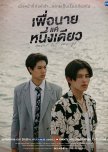
This review may contain spoilers
Objectively not good but I mostly enjoyed it anyway
I gave this a low rating because honestly the drama just isn't very good? The writing was nonsensical with huge plotholes and the acting was um....well... I'll go with shaky. Pond has the acting range of a brick and Phuwin has zero ability to pretend to be a teenage mafia mogul. But for some reason I enjoyed a lot of this anyway. For one thing, P&P are gorgeous and have good chemistry. They definitely had some very sweet moments in the first half and when they are hiding out with Palm's mother at the beach (shoutout to the actress who portrayed mom, she was great). I teared up when Nuengdiao dances with Palm in the hotel room, that was lovely. Also the actors who portray Ben and Chopper are very good and shout out to the director for having Nuengdiao's first kiss be with Ben and not the OTP, that killed the stupid I'm only gay for you BL trope. The cinematography and OST are also good. But the drama's second half is flat out terrible, like cover your eyes and cringe bad. I hope P&P get acting lessons and better scripts because I do enjoy watching them but ultimately this drama was just not it.Was this review helpful to you?

This review may contain spoilers
Achi's character doesn't work
The trailer for Thai Cherry Magic was super cute so I decided to watch the Japanese version while waiting for it to air, and I absolutely loved it. That made me even more excited to see what Thailand would do with the story, especially because I knew for sure we would get skinship that was missing from the Japanese adaptation. Unfortunately Thailand's version of Cherry Magic was a big letdown. The production values were great and the second couple was better than the Japanese version. But Achi's character didn't work at all. He was incredibly, frustratingly passive and didn't have the kindness that Adachi had in the Japanese version.The way the character was written, it never made sense for him to be hesitant to get into a relationship with Karan in the first place . He had the support of his coworkers who wanted them to get together and he said early on that he enjoyed the attention that Karan gave him. Yet he kept dragging his feet for no reason which made him seem passive and weak. Then after he finally made up his mind to get into a relationship, the writers suddenly threw in the company policy against dating and Karan being forced by the boss to make an impossible sales goal. Karan did all of the work to keep their relationship alive, including getting on his knees in front of an abusive client, while Achi did nothing to help or protect him. I couldn't care at all about Achi after that.
That was the biggest problem that sank the character but there were other weird writing decisions as well, like having Rock help Pai instead of Achi when her ex was berating her and having Karan's sister be the one to convince her mother to accept his relationship instead of Achi doing it.
There were things I liked about the Thai version: Tay's performance was lovely, I had some problems with how Karan was written but he was sweet and charming and made the character a lot more lovable than he would have been otherwise. I also enjoyed Jinta being a chaos gremlin all the time (though why didn't they have him lose his virginity in the end??). Pai and Rock were cute but underdeveloped, though Sing's performance did a lot to make up for the sketchy writing. The next to last episode in Pattaya was charming and the lovemaking scene was very well done so kudos for that.
But overall I have to say this was a disappointment. It also makes me nervous about the upcoming GMMTV adaptations of Ossan's Love and My Love Mix Up. I think maybe Japan and Thailand are too culturally different for these adaptations to work well but i guess we'll find out.
Was this review helpful to you?
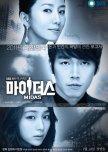
This review may contain spoilers
Don't let the financial terms scare you
This is a pretty tightly plotted drama about the battle between Jang Hyuk's character, a person who grew up poor and became a brilliant financial broker, and his mentor, a woman who's a Wall Street veteran from a chaebol family who has no scruples and a heart of ice.The drama's main focus is on the financial battles and it's obvious that whoever wrote the script did their homework since it's stuffed with terms like M&A, financial holding companies, hostile takeovers, white knight investors, etc. I don't think you need to understand all the terms to understand what's going on because it's generally explained in the context of the drama but I can see why this might turn off viewers. I personally found it interesting because the stakes throughout are sky high with family betrayals, stints in prison, affairs and even a few murders.
Jang Hyuk is uncharacteristically restrained here. You won't see him screaming or fighting (much) or taking off his shirt (except for one memorable sauna scene). It's still a good performance as you see the cogs turning in his brain as he tries to outwit the woman he once worshipped but who betrayed him and is now trying to destroy him.
Kim Hee Ae is terrific as the rich bitch who seems to have everything under control until she becomes locked in a battle with Jang Hyuk and is threatened by her partners, the owners of a shadowy hedge fund that launders money from illegal sources. She and JH had great chemistry and I wish her character had been romantically involved with him instead of Lee Min Jung. A love to hate story would've been a lot more interesting than the anemic romance we got (more on that below).
I enjoyed the chaebol family betrayals between Kim Hee Ae and her older brothers as their father pits them against one another to get a piece of his fortune. But the youngest brother was completely useless. You could completely cut him out of the story and you wouldn't miss a thing. I'd say the youngest sister is pretty useless too except there's a plot twist involving her that becomes very important to the story in the end.
The only thing I really disliked was Lee Min Jung as the female lead. Her character was boring and self righteous and spent most of the drama lecturing Jang Hyuk. I've enjoyed this actress in other dramas so I think it was mostly a writing problem but the actress also had zero chemistry with JH, which really became noticeable when contrasted with the sexual tension between JH and Kim Hee Ae.
A lot of people disliked the ending because it wasn't the typical "bad guys get punished" ending but I thought it worked for this drama.
Was this review helpful to you?
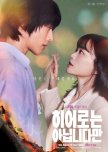
This review may contain spoilers
Not your typical time travel story
The Atypical Family is incredibly well written with complex characters who change and grow in surprising ways. Though many of the characters are morally gray the show's lens is deeply humanistic and you'll grow to care for these very flawed human beings. The show's central message is don't regret the past or worry about the future, live in the present and love the people close to you.Time travel is handled very differently in this show than in dramas like Lovely Runner and Twinkling Watermelon. In those shows, time travel creates different timelines and it is possible to change the past and the future. But The Atypical Family is more like the film 12 Monkeys, which has a single closed time loop. It's not possible for the time traveler to change the past or the future because their actions simply cause events that were going to happen anyway.
The closed time loop turns this into a very Buddhist story. Buddhism puts a huge emphasis on the idea of non-attachment, which means letting go of what you can't control and focusing on the present moment. There is also the central idea of loving-kindness, viewing yourself and those around you with compassion, generosity and empathy.
Gwiju starts out from a place of: I need more control, I need to control my own destiny. He wants to change his past and future and it's his repeated failures to do so that turn him into a depressed alcoholic. But after Dahae enters his life, he gradually realizes that he can't change his fate but he can change how he reacts to that fate. He can become a more loving and responsible person no matter what has happened in the past or what will happen in the future.
Gwiju isn't the only person who has to learn this lesson. Dahae needs to detach from the idea that she can avoid the pain of her traumatic past by manipulating and controlling the men she scams and instead embrace her found families. Dong Hee needs to detach from the idea that her weight has anything to do with whether or not she can fly and instead allow herself to eat joyfully and be happy. Bok Eomma needs to detach from the idea that her prescient dreams will keep her and her family safe and stop using them to control people. And even Ina needs to detach from both her fear of her mind reading powers and her belief that those powers can be used to manipulate people into giving her friendship and understand that she is a loveable and worthwhile person.
I think it's this emphasis on detachment and acceptance that truly sets Atypical Family apart from other time travel stories. What's amazing is that despite a philosophy that sounds like it would lead to stagnant, boring storytelling, the drama is absolutely gripping and the last half hour is hugely cathartic. I cried buckets at the end.
In addition to the amazing writing and the interesting philosophy of the drama, I have to shout out the acting performances which are uniformly great. Special mentions for Jang Ki Yong in his first post-military drama; Chun Woo Hee for portraying a morally ambiguous female lead and making us care about her; Park So Yi for more than holding her own with the adult actors; and Claudia Kim for humanizing a character who could've been an offensive caricature.
I also have to mention the amazing cinematography and the OST which is phenomenal, probably the most sophisticated OST I've ever heard in a drama.
There are very few things I disliked about this drama but many people struggle with the FL's behavior in the early episodes, as well as the ML's neglect of his daughter due to alcoholism and trauma. There are also a lot of people who don't understand the time travel rules in this universe and had trouble understanding the ending. I even made graphics to explain it: https://x.com/daebakpodcast1/status/1800000910699147378
Verdict: So far this is my favorite drama of the year and one of my favorite dramas ever.
Was this review helpful to you?

This review may contain spoilers
2017 version vs. 2003
I noticed a lot of the reviews negatively compare the 2017 version of Kimi Wa Petto to the 2003 version but as someone who thought both versions had plusses and minuses I thought I'd compare them a little more fairly.----------------
Female Lead
----------------
I liked the FLs in both versions but they are very different. The 2003 FL is a hard driving bitchy ice queen who would rather die than cry in front of anyone but then goes home and freaks out when no one but her pet is looking. The actress is extremely good at letting you see the vulnerability in her eyes even when she's struggling to maintain the facade. The 2017 FL is more like a class topper, she is exceptionally good at her job and always does her homework but she's deeply insecure and when she gets into a relationship with her senpai she can't bring herself to show him any vulnerabilities or flaws. It's hard to say who I prefer because they are so different from one another. I enjoyed and appreciated both.
--------------
Male Lead
--------------
Here's where my biases come in because I really can't stand the 2003 ML, Matsumoto Jun. He is like nails on a chalkboard for me and the main reason I wasn't able to finish the 2003 version even though I loved the FL. I'm not convinced he's a world class dancer, he's just ridiculously OTT and I couldn't ship him with the FL. The 2017 ML, Shison Jun, is much better in the role as a gifted dancer who is buckling under the pressure of his career but heals himself by becoming Sumire's pet. Shison brings a lovely vulnerability to the character but he is also able to convince you that he is actually a for real man who is maturing in front of our eyes to become a person who can truly be a partner to Sumire.
----------------------------
Secondary characters
----------------------------
I liked the 2MLs in both versions but the relationship the FLs have with the men is very different. The 2017 version has a lot more skinship but the sex scenes with the 2ML aren't sexy at all. The FL always looks like she's cringing whenever they get intimate and it's so incredibly uncomfortable to watch, I think on purpose to show how the FL can never be vulnerable with him. That's why I think the portrayal of the 2ML works better in the 2017 version, those horribly uncomfortable sex scenes provide an enormous contrast with the scenes of Sumire cuddling Momo.
Fukushima the receptionist was a lot more interesting in the 2017 version, we gain some insight into why she's such a schemer and it makes her a lot more sympathetic. I also found her interactions with Momo to be eye-opening, his cold-blooded side comes out with her and he's willing to harm her to protect his owner which is kind of chilling. Fukushima's relationship with Hasumi becomes poignant at the end and I was actually glad they got their happy ending.
The friend is cute in both versions, don't have much to say about that. The coworkers in the 2017 version were better developed and I especially liked the colleague who questioned the ethics of journalism.
The 2003 version has a psychiatrist with a small dog and he was great, wish they'd had the character in the 2017 version, especially because it's much longer so they had time for him.
--------
Story
--------
The 2003 version has 10 episodes compared with 16 episodes for the 2017 version. I think the 2017 version could be shorter, maybe 12-14 episodes, because it gets a little draggy and repetitive toward the end. On the other hand, the increased length means we get a lot more development of the relationship between Hasumi & Sumire and Hasumi & Momo (Momo genuinely likes Hasumi vs. the more antagonistic rivalry between the men in the 2003 version)
I think with more time to develop 2017 relationship between Hasumi and Sumire, you see how he's not a bad guy in many ways but he's insensitive and selfish when it comes to sex and Sumire will never be able to feel comfortable with him. Something I really liked is when Hasumi gets transferred to Seoul, Sumire becomes depressed and wants to call and text him and her friend observes that she prefers a relationship with an absent boyfriend. (not sure if this happened in the 2003 version since I didn't watch the whole thing)
2003 Sumire seems a lot more in love with Hasumi than 2017 Sumire who seems more in awe of him. The breakup with Hasumi is kind of heartbreaking in the 2003 version but not at all in the 2017 version.
In 2017 we also get a lot more development of Hasumi and Fukushima, including her becoming his pet and learning her back story. It made me much more sympathetic to both characters. It was interesting seeing the contrast between how the owner/pet relationship played out between Hasumi & Fukushima where she was a high school dropout with an alcoholic father vs. Sumire & Momo/Takeshi where he has a high profile career of his own.
I think the breakup was handled better in the 2017 version because it was initiated by Sumire and she and Hasumi were able to be truly honest with each other for the first and last time (both of them come clean about the pet relationships). The 2003 version had a jealous Hasumi dump Sumire after she tells him about her pet.
I prefer the ending of the 2017 version with Momo leaving to pursue his dance career in Europe while Sumire works and waits for him to return. It made more sense to me and showed the growth of the characters better than the 2003 version where the psychiatrist convinces Momo to abandon his trip to Germany and Momo ends up getting hit by a motorcycle and breaking his arm before reuniting with Surime. It feels like the 2003 version very explicitly doesn't want you to see growth in the characters and instead ends it with both of them essentially the same in an undefined relationship that isn't exactly pet and owner anymore but also isn't a full sexual relationship.
-----------------
Final Verdict
-----------------
The 2003 version has a stronger FL. The 2017 version has a more complex and interesting ML, 2ML and 2FL. The 2017 version is much longer and gets draggy but also has better character development and a more interesting ending for all the characters. Honestly, I enjoyed the 2017 version more even with the problems with the FL being significantly weaker than in the 2003 version.
Was this review helpful to you?

This review may contain spoilers
Solidly good drama
I enjoyed this drama a lot but I'm not as enthusiastic about it as a lot of people here who rate it a masterpiece. It's a solidly good drama with an intricate time travel plot that miraculously doesn't unravel despite some loose threads here and there. The characters are likeable, esp. Huang Yu Xuan, Mo Jun Jie and older Li Zi Wei. The performances of the core three actors are very strong, with a special shoutout to Alice Ke who is brilliant in a double role that requires a lot of subtlety and nuance. The OST is lovely and Last Dance is a perfect song to trigger the time travel sequences, loved that.Having said that, here's why I don't think SD1D is a masterpiece:
1) The drama is very slow to start. Honestly if I hadn't seen and loved Rainless Love in a Godless Land first I might have dropped after the second episode. I kept going because I trusted the creators.
2) The core couple didn't convince me that their love was so epic that it spanned space and time. They seemed like a perfectly lovely 20 something couple but nothing that special and that causes problems in a story that hinges on their fated love. Having said that, ep. 9 (LZW travels forward in time to woo HYX) made me sob.
3) Chen Yun Ru's villain arc is introduced in the next to last episode. She was a fascinating and complex character, sympathetic and unlikeable at the same time. She needed more development so we could be as invested in her story and redemption as we were in the core romance. I also wanted to see more of her with MJJ because he was such a great character and also didn't get enough screentime as the story progressed.
4) The psychiatrist's storyline ultimately didn't amount to much esp. given how much time is devoted to the arc.
I still really enjoyed this drama and will recommend it to friends.
Was this review helpful to you?
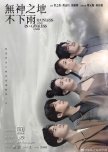
This review may contain spoilers
Gorgeous, mesmerizing fantasy that doesn't stick the landing
This is an incredibly creative, innovative and ambitious drama that ultimately falls short but is worth watching anyway. The drama is based on the mythology of the Amis people, who are the indigenous people of Taiwan. Each episode opens with a beautiful animation illustrating an Amis folktale narrated in their native language and the language is also used in dialogues by the gods.Some of my favorite things about this drama:
> The narrative structure: The show explores memory, loss, grief and time. It makes extensive use of flashbacks, which is something I normally hate. But in this case the flashbacks were the story, like thematically and in terms of what we learn at the end, the entire thing is rooted in the fluidity of time and how what we knows shifts and changes as we move back and forth through the timeline. Sometimes it felt overwhelming and ultimately didn't quite work once I got to the end but I respect that the writing team went for it, it is not easy to create a narrative like this. I love that they Went For It.
> The animations: Absolutely gorgeous, kudos to the artist and also to the writers for conceiving this way to address the mythology of the story. Every single animation tells you something extremely important to the story, including the ending which was telegraphed very early on but of course we only realize that in retrospect. If you're finished watching, read this thread that documents the narration and art in every opening: https://twitter.com/Hoyaanae/status/1455182655524245514
> The cinematography: Absolutely stunning, just on the level of pure beauty this drama delivers.
> The OST: One of the best I've ever heard, it's been on repeat in the car and I've never listened to Mando music before. And it turns out it telegraphs the entire plot and ending of the story only you won't realize it until you're done.
> The acting: Everyone was great but special shoutout to Alice Ko as Toem, the goddess turned evil. Her performance was scary, subtle, nuanced and ultimately heartbreaking. Fu Meng Bo was also perfect as Orad, the god in love with a human. You've never seen someone pine so beautifully.
What I didn't like:
> The ending. It is a gigantic shock and not in a good way because it takes a lot of drama's intricate plot and flushes it down the drain. I was literally screaming at the screen when I realized how it was going to end. Having said that, it was moving to see Orad's joy at the end and how all of the kawas and sikawasay end up so that somewhat made up for the mindf*ck of an ending.
> The main ship: I didn't hate them together but they didn't have the intense chemistry that I felt was needed to sell me on their epic romance. The ending would've been more palatable if the chemistry had been better.
> The ecological angle: this turned out to be a plot device that was abandoned pretty early on which was a missed opportunity.
Despite the ending I haven't been able to stop thinking about this drama. It's truly mesmerizing, like a beautiful dream that you immerse yourself into and allow to take over your mind. Go in with zero expectations about where the narrative will land and you will be in for a drama watch like no other.
Was this review helpful to you?

Dumb but fun
This show is completely ridiculous, the writing is bad and the plot makes no sense but I had so much fun watching it anyway and it's because of the chemistry between three of the couples:Irin-Hack (Lookjun & Krist): They fed me the toxicity I was hoping for from the whole series. Completely dysfunctional, falling into bed with each other and then saying hurtful things, I loved it. Their reconciliation was rushed but made sense and I strongly shipped them. Super fun.
August-Pine (Pat & Off): Another toxic couple with OTT sexy vibes. August served c*nt as an older successful woman with no time for BS or a relationship. Pat and Off had fire chemistry and looked fantastic together. Their story didn't make much sense and I didn't like how it wrapped up but the sparks were there in their scenes.
Florence-Nathee (Aye & Luke): This was my favorite couple. Florence knew she wanted Nathee's fine @ss and she went after him without holding back. They were hilarious and sexy together. I'd love to see Aye and Luke paired up again (come on GMMTV, don't just create BL supercouples, give us a few straight ones too)
Was this review helpful to you?



















